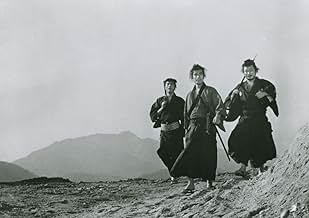Quando camponeses pobres sequestram a filha de um magistrado para coagi-lo a reduzir seus impostos injustos, um ronin errante decide ajudá-los.Quando camponeses pobres sequestram a filha de um magistrado para coagi-lo a reduzir seus impostos injustos, um ronin errante decide ajudá-los.Quando camponeses pobres sequestram a filha de um magistrado para coagi-lo a reduzir seus impostos injustos, um ronin errante decide ajudá-los.
- Direção
- Roteiristas
- Artistas
Avaliações em destaque
The film seems like it was intended to start a series based on the three characters. Too bad that didn't happen.
After a title sequence with a bombastic score, the action begins almost immediately in this film. A wandering Samurai stumbles upon a hostage situation - a few pathetic peasants (not too different from the ones in Seven Samurai) are holding the daughter of an aristocrat hostage in the hope that he would waive taxes. After observing the bumbling peasants and their failed negotiations with the aristocracy for a while, the cynical Samurai decides to join the fight on the peasants side.
While watching this film, it struck me that the Samurai attitude towards life is not too different from the cowboys in spaghetti westerns or protagonists in Noir thrillers. They are very cynical and are always watching how the situation unravels. But they often put their neck on the line in the end.
The treatment and portrayal of women in this film is quite hilarious and politically incorrect.
I liked the way the director balanced the different aspects of the film - the film is a mix of cynical tongue in cheek humor and relentless action while also foregrounding themes like samurai honor and the plight of peasants.
The plot, like a Noir film is quite complicated.
(7.5/10)
Of course, there are Gosha's typical studied camera angles and compositions (you see some interesting "moving camera" work, which significantly predates the attempts of "pioneering" US directors). However, "Sanbiki no samurai" also showcases Gosha's ability to tell a story through facial expressions, rather than simply relying upon dialogue.
This is all film-school wankery. The bottom line is that "Sanbiki" is a gripping chambara flick, with a solid morality tale disguised as a cynical amorality tale. (Note that a common theme through many Japanese "chambara" is that of cynical ex-samurai who ultimately decides to risk life and limb for some hopeless but noble "little guy" cause.)
This theme was repeatedly, um, emulated by the likes of Sergio Leone with his spaghetti westerns. However, my point is that such tales are just plain entertaining. The three actors playing the samurai also turn in great performances.
Viewers new to Hideo Gosha may wish to start with "Goyokin" or "Hitokiri" (a/k/a "Tenchu"), but if you've seen those two already (or if they're already checked out), then this is still a definite movie to catch!
Você sabia?
- CuriosidadesHideo Gosha's directorial film debut.
- Citações
Sakon Shiba: [Threatening to kill the Magistrate; his daughter physically intervenes] For his victims' sake, I can't allow him to live.
Aya: Please!
Sakon Shiba: Move, or I'll kill you!
Aya: Kill me, then. No matter what he's done, I'm still his daughter.
Sakon Shiba: [the Magistrate breaks free and runs for it, but Shiba deftly cuts off his top knot with a quick thrust of his sword] Let the lord see you in disgrace. Let the peasants see you in disgrace.
- ConexõesFeatured in Best in Action: 1964 (2020)
Principais escolhas
- How long is Three Outlaw Samurai?Fornecido pela Alexa
Detalhes
- Tempo de duração
- 1 h 34 min(94 min)
- Cor
- Mixagem de som
- Proporção
- 2.35 : 1































